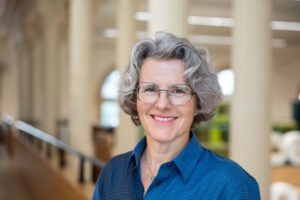SEASON 2025: Conference Overview
Important Dates
- Submission for all categories via EasyChair:
30th of April 2025 10th of May 2025
- Notification: 20th of June 2025
- Revised submissions: 15th of July 2025
- Conference dates: 24-25 September 2025
Registration and conference fee
Register now to join us at the SEASON 2025 Conference: https://easychair.org/my/conference?conf=season2025 .
Early bird rates (until 1 August 2025):
-
€100 (regular)
-
€30 (student)
After 1 August, the registration fees will rise to €150 for regular attendees and €50 for students.
For assistance with the registration and payment process on EasyChair, please refer to our step-by-step guide, available here:
Registration and Payment Guide- SEASON 2025
Keynote Speakers
Wednesday, September 24, 2025
Prof. Anne Beaulieu
Search engines beyond search: questions for a critical knowledge infrastructure
 Prof. dr. Anne Beaulieu holds the Aletta Jacobs Chair of Knowledge Infrastructures at the University of Groningen, The Netherlands. She is co-author of Data and Society: A Critical Introduction (Sage, 2021), of Smart Grids from a Global Perspective (Springer, 2016), and of Virtual Knowledge: Experimenting in the Humanities and Social Sciences (MIT Press, 2012). She also chairs the editorial board of the Liveable Futures book series at Amsterdam University Press. In 2023-24, she was joint fellow of the Institute for Advanced Study and of the Data Science Centre at the University of Amsterdam. Between 2018 and 2022, she co-coordinated the PhD training network of the Netherlands Graduate Research School of Science, Technology and Modern Culture (WTMC). This presentation is based on her book Revealing Relations: Knowledge Relations for Liveable Futures (Bristol University Press, 2026).
Prof. dr. Anne Beaulieu holds the Aletta Jacobs Chair of Knowledge Infrastructures at the University of Groningen, The Netherlands. She is co-author of Data and Society: A Critical Introduction (Sage, 2021), of Smart Grids from a Global Perspective (Springer, 2016), and of Virtual Knowledge: Experimenting in the Humanities and Social Sciences (MIT Press, 2012). She also chairs the editorial board of the Liveable Futures book series at Amsterdam University Press. In 2023-24, she was joint fellow of the Institute for Advanced Study and of the Data Science Centre at the University of Amsterdam. Between 2018 and 2022, she co-coordinated the PhD training network of the Netherlands Graduate Research School of Science, Technology and Modern Culture (WTMC). This presentation is based on her book Revealing Relations: Knowledge Relations for Liveable Futures (Bristol University Press, 2026).
Abstract: Search engines play a powerful role in ordering knowledge and in shaping interactions with data, sources or documents. The current dominance of ‘search’ has been well documented and various facets (relevance, optimization, ranking, bias) have been examined and refines in sophisticated ways. But as search engines become further embedded in layered knowledge infrastructures, it is all the more important to unearth how search shapes knowledge needs and how these needs are met. In this presentation, I want to share a number of questions to explore important assumptions of search engines: It is possible to imagine other functions for search engines, besides supporting retrieval? Can a search engine succeed otherwise than through best match? Can assumptions be foregrounded so that search engines are more reflexive–at what cost and with which advantages? How do conversational interfaces increase the urgency of questioning these assumptions? These questions can spur new interactions and explorations across lines of work, connecting epistemology and design, ethics and computation, politics and indexing.
Thursday, September 25, 2025
Matthias Spielkamp
AlgorithmWatch: Algorithmic Accountability Reporting Revisited

Photo: Julia Bornkessel, CC BY 4.0
Matthias Spielkamp is co-founder and executive director of AlgorithmWatch (Theodor Heuss Medal 2018, Grimme Online Nominee 2019, Brandenburger Freiheitspreis 2023) and founder and president of AlgorithmWatch CH. He is a member of the advisory council to the German Digital Services Coordinator (DSC), elected by the German Bundestag. Matthias testified before committees of the Council of Europe, the European Parliament, the German Bundestag and other institutions on automation and AI and was a member of the Global Partnership on AI (GPAI) from 2020-2022. Matthias serves on the governing boards of the German section of Reporters Without Borders and Stiftung Warentest, the advisory councils of Freudenberg Stiftung and the Whistleblower Network and the Expert Committee on Communication/Information of Germany’s UNESCO Commission. He was a fellow of ZEIT Stiftung, Stiftung Mercator and the American Council on Germany. Matthias is editor of the Automating Society reports and has written and edited books on the automation of society, digital journalism and Internet governance. He holds master’s degrees in Journalism from the University of Colorado in Boulder and in Philosophy from the Free University of Berlin.
Abstract: In 2015, a handful of people set out to create an entire organisation around the idea of “holding algorithms accountable to democracy”. 10 years later, after various attempts to pry open the black boxes of search engines, social media and “AI”, it’s time to take stock: What have we achieved, what is still lacking, what is on the horizon?
Programme Committee
- Rosie Graham, University of Birmingham, UK
- Jutta Haider, SSLIS, University of Borås, Sweden
- Dirk Lewandowski, Hamburg University of Applied Sciences, Germany
- Astrid Mager, Institute of Technology Assessment Vienna (ITA), Austria
- Renée Ridgway, Aarhus University, Denmark
- Sebastian Schultheiß, Hamburg University of Applied Sciences, Germany
- Olof Sundin, Lund University, Sweden
- Kristofer Söderström, Lund University, Sweden
Travel Information
The organisers recommend that participants travel by train. The event will take place at the Faculty of Design, Media and Information at Finkenau 35 in Hamburg.
Contact Information
We look forward to welcoming you to Hamburg in September. If you have any queries or questions, please contact:

 Prof. dr. Anne Beaulieu holds the Aletta Jacobs Chair of Knowledge Infrastructures at the University of Groningen, The Netherlands. She is co-author of Data and Society: A Critical Introduction (Sage, 2021), of Smart Grids from a Global Perspective (Springer, 2016), and of Virtual Knowledge: Experimenting in the Humanities and Social Sciences (MIT Press, 2012). She also chairs the editorial board of the Liveable Futures book series at Amsterdam University Press. In 2023-24, she was joint fellow of the Institute for Advanced Study and of the Data Science Centre at the University of Amsterdam. Between 2018 and 2022, she co-coordinated the PhD training network of the Netherlands Graduate Research School of Science, Technology and Modern Culture (WTMC). This presentation is based on her book Revealing Relations: Knowledge Relations for Liveable Futures (Bristol University Press, 2026).
Prof. dr. Anne Beaulieu holds the Aletta Jacobs Chair of Knowledge Infrastructures at the University of Groningen, The Netherlands. She is co-author of Data and Society: A Critical Introduction (Sage, 2021), of Smart Grids from a Global Perspective (Springer, 2016), and of Virtual Knowledge: Experimenting in the Humanities and Social Sciences (MIT Press, 2012). She also chairs the editorial board of the Liveable Futures book series at Amsterdam University Press. In 2023-24, she was joint fellow of the Institute for Advanced Study and of the Data Science Centre at the University of Amsterdam. Between 2018 and 2022, she co-coordinated the PhD training network of the Netherlands Graduate Research School of Science, Technology and Modern Culture (WTMC). This presentation is based on her book Revealing Relations: Knowledge Relations for Liveable Futures (Bristol University Press, 2026).